Tagged: Personal Branding
What We Can Learn About Personal Branding From Louise Linton's Instagram Fiasco
- by Alyson Shane
I'm not often one to bring together politics and my profession, but sometimes public lessons bear repeating.
This morning I was listening to the NPR Politics Podcast (which I high recommend for all you political wonks out there) and in the final section of their show they discuss stories they "can't let go." In the segment, Congressional reporter Susan Davis mentioned a fiasco involving the U.S. Treasury Secretary and his wife, Louise Linton.
Here's the story in a nutshell:
- The original post. Louise posted a photo on her Instagram account, which was public at the time but is now private, of herself and her husband disembarking from a government airplane (the photo has also now been deleted.)
- Humblebragging. The primary reason Louise came under fire was because she included several hashtags mentioning the multiple designer label items she was wearing. Commenters felt that she was bragging about her wealth and using a government plane.
- Feeding the trolls. One commenter left a comment which read: "Glad we could pay for your little getaway #deplorable" to which Louise responded with a comment where she claimed she and her husband were "bigger patriots" than the commenter (see below).
- Going viral. As a result of Louise's reaction to the comment, the story blew up all over news networks and drew a lot of attention from the media.
- Watchdogs get involved. The story viral highlighted the couple's trip on a government airplane, which let to the watchdog group Citizens for Responsibility and Ethics in Washington (CREW) filing a FOIA to investigate whether or not the couple planned the trip using the government plane specifically to get a good view of Monday's solar eclipse.
Breaking It Down
While Louise Linton's story isn't uncommon - lots of people say/do things online which acerbate a situation, after all - it's relevant because it's a pertinent example of how a mismanaged personal brand can have far-reaching negative consequences for the individual.
Let's explore in more detail:

The Original Post
Let's start with the facts: Louise Linton is married to a politician, which means that she is going to come under just as much fire and scrutiny as her husband. This is normal, but we live in times which are defined by the growing gap in inequality between the 1% and the poor, especially in the United States.
As a result, someone in her position needs to be especially careful about what she shares as she builds her personal brand, and the role that information plays in a larger narrative about herself and her husband, Republicans, and wealth inequality in America.
Obviously none of these thoughts were present when she posted her photo to Instagram. Honestly, the photo itself isn't terribly troublesome; it shows the couple walking off a government plane and looks like your typical "politicians going to and from places" photo that we've seen of basically every politician at some point in time.
The problem was that she used the post as an opportunity to showcase the variety of designer items she was wearing. By deliberately including these hashtags she went out of her way to flaunt her wealth, which doesn't bode well in a time when the income gap in America is as worse as it's ever been.
As a result, some people got upset.
The Fallout
Of the many comments left on the post, this one seemed to be particularly upsetting for Louise:

She responded with a lengthy, condescending comment which included the following excerpt:
“Cute! Aw!!! Did you think this was a personal trip?! Adorable! Do you think the US govt paid for our honeymoon or personal travel?! Lololol. Have you given more to the economy than me and my husband? Either as an individual earner in taxes OR in self sacrifice to your country?”

In the immortal words of Bianca DelRio: "Really, Queen?"
In addition to being incredibly condescending, Louise's comment strikes a few critical nerves here:
- She's deliberately dismissive of the commenter from the get-go.
- She flat-out denies that her trip was a personal one.*
- She insults the commenter by insinuating that she and her husband "give more" because they pay more in taxes... ostensibly because they earn more.
- She accuses the commenter of not being as patriotic as herself and her husband as a result of their tax contributions.
*(which has since turned out not to be completely true)
For someone who lives in the public eye, and who is married to a wealthy and influential politician whose effectiveness within government depends on his ability to identify with and relate to his electorate, this was about the worst possible comment she could have made.
In addition to breaking the number one rule of the internet (don't feed the trolls), her comment aggravated the situation because it clearly demonstrated that she thinks she doesn't see herself as someone who can relate to, or is even on the same playing field as, the people commenting on her photo. And this is probably true: if she can afford a Hermez scarf, Tom Ford sunglasses, and Valentino heels (among others) then she's clearly in a significantly different place than many of her followers.
However: that doesn't make it appropriate to point it out, especially in the way she did.
Coming Under Fire
The most fascinating aspect of this story was that her Instagram fight went viral, and wound up attracting the attention of the CREW watchdog group.
Now, because Louise didn't properly manage her personal brand, she and her husband are coming under fire for potentially using government aircraft for a personal excursion and are the subject of increased scrutiny and media coverage.
We often hear the expression There's no such thing as bad publicity, but in this case I'd be willing to bet that Louise wishes she'd never posted the photo at all. Primarily because she's since deleted the image and made her account Private.
Why Is Her Situation Different?
We live in the age of the Instagram influencers, and there are thousands (maybe more) of users who have built up followings, established relationships with brands, and build personal media empires based on using hashtags to establish influence and get in front of major retailers, agents, brand managers, and the like.
One could argue that, as a small-time actress, Louise was just trying to get in front of the brands she'd like to work with, and I'm inclined to agree that that's probably exactly what she was doing.
So what makes Louise's situation different? Simple: she's married to a politician.
This fact shifts the perception of her personal brand away from "small-time actor and budding influencer" to "politician's wife flaunting their wealth." It means that what she says and does is much more likely to come under fire, which means she needs to be extra-mindful of how she presents herself and her lifestyle online.
When building our personal brands we need to be mindful of the ways in which others will perceive what we post, say, and do. Of course, we can't please everyone all the time, but part of developing a strong personal brand is identifying our positive strengths, showcasing our passions, and doing our best to be a supportive and inclusive member of whichever communities we're a part of.
Louise Linton's Instagram post did none of those things, and by engaging in a comment fight she further undermined any credibility she may have had by demonstrating that she saw herself as being on a pedestal compared to the average American.
What Can We Learn?
Louise Linton's Instagram fiasco can be summed up in a few key points which should be seared into the minds of anyone attempting to build a personal brand:
- Like Kendrick Lamar says: Be humble. Part of building an effective personal brand is telling a story of growth and progress, so sharing success stories, collaborations, unique opportunities and experiences, and the like is often part of that process. But going out of your way to publicly flaunt your wealth is never cool or relatable; in fact, it's usually the opposite.
- Think before you post. We're all guilty of posting dumb stuff from time to time, but the larger our personal brands become, the more we need to think critically about what we say and do, and how it may make others feel.
- Ask yourself: who will connect with this content? Louise Linton is a politician's wife, which means the majority of the people who engage with her content are either people who like or dislike her husband and what he represents to them. Even if Louise's primary goal with her content was to get in front of designer brands and high-end influencers, she should have been more aware that the majority of people paying attention to what she's doing are people who can't afford to wear multiple designer pieces to take a ride on an airplane, which is going to garner more negative feedback than positive.
- Don't feed the trolls. Just don't do it.
- If you *absolutely have to comment back*, again: be humble. Apologize. Play nice and be civil. We win more friends with honey than with vinegar, after all, and if Louise had just apologized or been more demure in her response the public fallout, media coverage, and subsequent CREW involvement may never have happened.
At the end of the day, building a strong personal brand doesn't happen overnight, and it takes concerted effort to continue to build momentum and share content which resonates with your audience and projects the best version of yourself forward.
There are lots of ways you can connect with your target audience, get in front of brands and labels, and establish yourself as an influencer in your niche.
Just try not to take the Louise Linton approach when you do.
Do you have any personal branding horror stories, or suggestions for what Louise could have done instead? Tweet at me or tell me in the comments!
Join me for a lunch + learn dedicated to personal branding
- by Alyson Shane
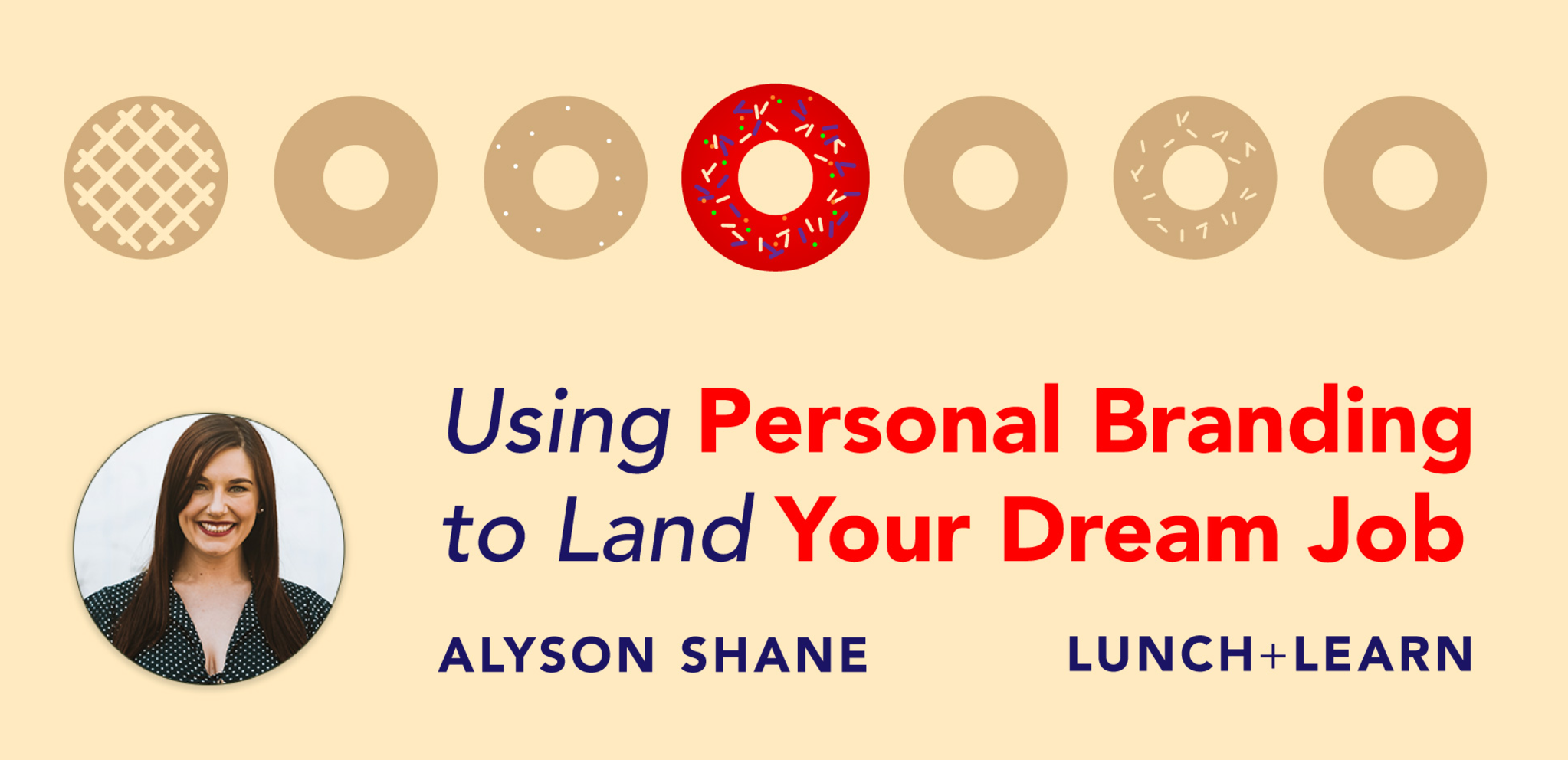
Figuring out who you want to be is daunting by itself - but what about figuring out who you are online?
If you've never thought about it before don't worry. Most people don't! In fact, most of us go about our daily lives, posting whatever we find, ranting about people that annoy us, and generally not giving a second thought to how the things we share might make us look to others.
Enter personal branding: the process of using social media and your digital presence to shape the narrative about who you are, what you do, and why you rock.
Why Does Personal Branding Work?
Many people think of personal branding as being inauthentic, or deliberately trying to pull the wool over people's eyes, but they couldn't be more wrong! I like to think of personal branding as the daily practice of putting your best foot forward and projecting the best version of yourself online.
Think about it this way: you're a smart, savvy professional who works hard and knows their shit, so why wouldn't you want people to know that about you right from the get-go?
What Can Personal Branding Accomplish?
I can say unequivocally that I wouldn't be where I am without my personal brand.
I realized several years ago (while I was in university, actually) that developing a strong presence online would help me get a job in my desired field and make connections, but I didn't really think too critically about it.
I posted to Twitter a lot and blogged regularly, which helped me start speaking and even landed me a segment on Shaw TV, but it wasn't until I shifted the focus of my website to be more "career-centric" and started sharing articles relating to social media and my industry that I started to acquire freelance clients and more speaking opportunities.
The more I shared, the more people began to see me as a local expert in my field, and as someone who could speak with authority about topics relating to my industry. I was able to accelerate this process by already having several years of online activity and recognition (aka, developing my personal brand!) to fall back on.
How Can You Develop Your Personal Brand?
Understanding how to shape your personal brand is one of the most valuable skills that we can learn in our digital age - I believe it's something we should teach everyone!
Luckily, there's no bad time to start developing your personal brand. It's really as easy as asking yourself some basic fundamental questions about yourself and your goals, signing in to your social accounts, and posting regularly.
Of course, there's a little more to it than that, which is why I'm hosting a lunch + learn with New Media Manitoba dedicated to helping you develop your personal brand!
Whether you're a student, freelancer, or professional looking to advance in your field and snag that killer new job, personal branding can help, and I'd love to show you how.
This event is FREE for NMM members, and only $10 for non-members, so what are you waiting for? RSVP and let's have some lunch and learn about how you can land your dream job by shaping how future bosses and clients think of you online.
Let's do this thing! Save your spot and let's get you that dream gig.
3 Things You Can Do Right Now to Get Noticed on Twitter
- by Alyson Shane
Without a doubt, the social network that people ask me about the most is Twitter.
Let me preface by saying this: the only reason I'm especially "good" at Twitter is because I've been an active user for a really long time. I first joined in December 2008 (thank you, Twitter) but didn't use it a lot at first. Part of that was that I didn't have a smartphone at the time, but the main reason I avoided it was because I didn't know what the heck to say.
Figuring out what is and isn't appropriate to share on Twitter and then trying to condense it down into 140 characters felt like a daunting and overly-complex experience, and for a long time I just "nope'd" out of it.
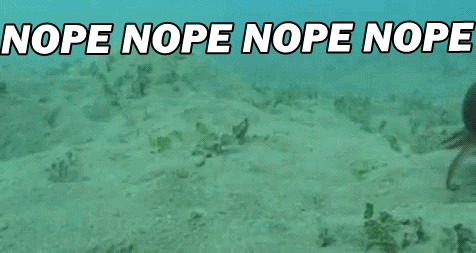
Eventually, though, I realized that I was over-thinking things way too much because (like all social networks) the main purpose of Twitter is to share your thoughts and talk to other people. That's it.
The issue that most people have with Twitter is that they over-think it. Too many people I know have asked me "is this okay to tweet?" before, and my response is almost always "yes, don't worry about it so much."
So how can you stop wringing your hands and gnashing your teeth every time you have to send out a tweet? Let's go over three quick things you can do right now:
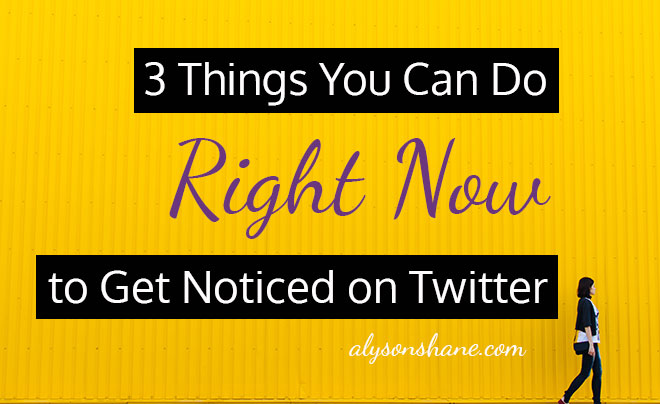
Use strong visual branding
The first thing other Twitter users will see (besides your clever, savvy tweets) is your profile picture. If you can, try to use a hi-quality photo of you that ideally isn't a selfie. As much as I love selfies, they're easy to spot and don't exactly scream "professional internet person."
If you have social media profiles on other networks, try to ensure that your Twitter profile looks similar and fits with the same theme in terms of colours, photos, and descriptive words, as well as including links to your website or blog, if you have one.
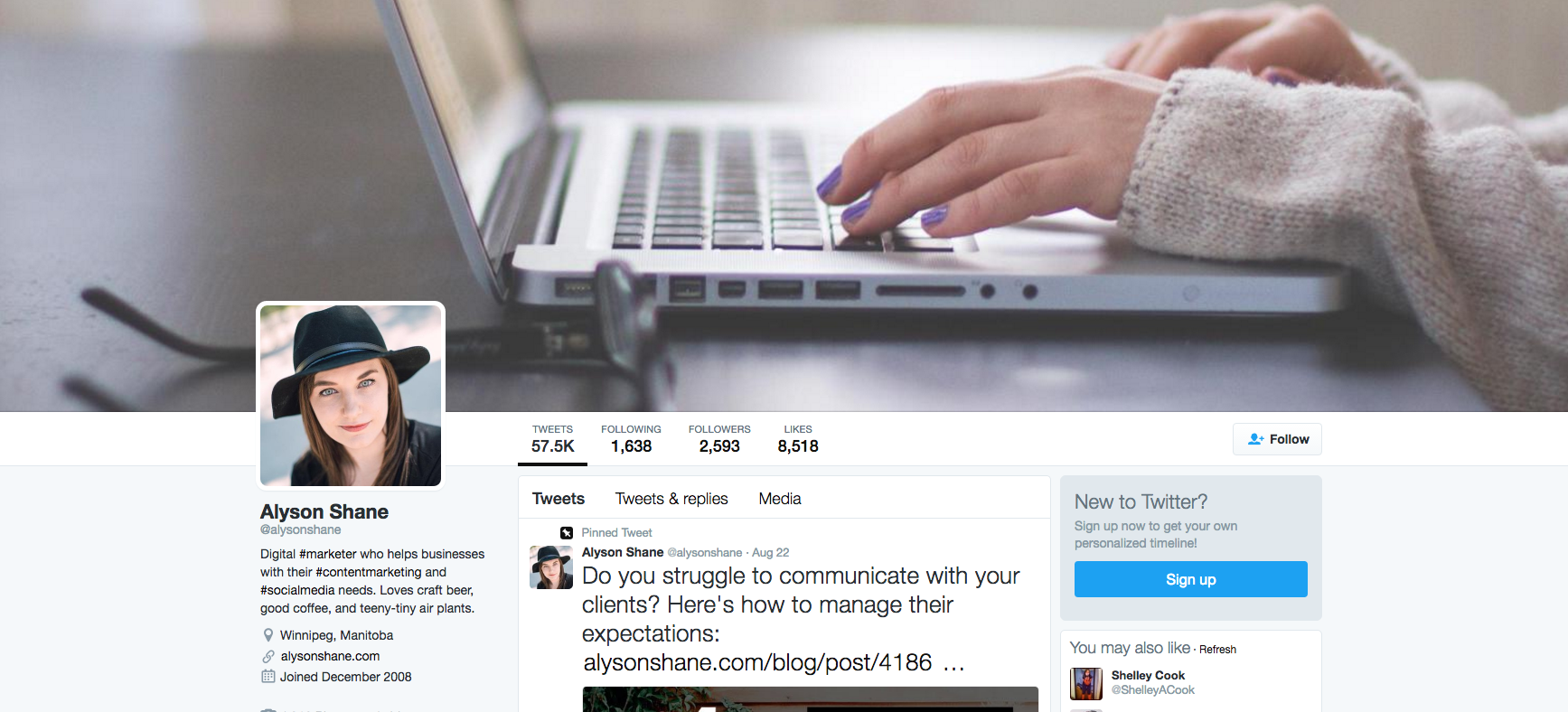
If we take a look at my profile, you can see that I briefly describe what I do for a living, and some stuff I'm into.
This combination of personal and professional works well because other users know what to expect from me in terms of Twitter content, and it's not aggressively sales-y so it doesn't turn off prospective new followers.
Have some variety in your tweets
I have no doubt that you're an interesting, complex, multi-faceted person who loves more than your favourite sports team or binge-watching the X-Files, so why would you limit the stuff you share online to only reflect that one side of your personality?
Because Twitter forces you to be concise it's actually a really great tool for showcasing different interests, thoughts, and opinions. However, it's important to be diverse enough that people don't get bored of your content, and that you're actually engaging with other people.
For example, posting life updates with no context is fine once in a while, but don't crutch on it because most users can't relate to your life, specifically. On the flip side, only sharing memes and gifs doesn't help people get to know you as a person, which is what Twitter is actually for.
Instead, try to post a variety of things from the following topics:
- Random thoughts/life updates
- Links to cool articles and interesting stuff
- Funny gifs and memes
- Stuff relating to your profession (if you're the kind of person who is comfortable talking about their work online)
- Blog posts and other content you've created (if you're a content producer)
- RT's and quoted content
- Tweeting at and replying to other users
Don't abuse hashtags
Hashtags are how users on Twitter (and now other social networks, too) connect their Tweets to a larger shared topic or idea. For example, people tweeting about their long weekend plans will use the hashtag #LongWeekend. That way when people search for hashtags relating to the long weekend, theirs will pop up.
While hashtags are a great way to connect your thoughts to a larger public discussion, they don't look very visually appealing and jamming your tweet with hashtags makes your 140 character message basically impossible to read. If possible, keep hashtags to a minimum and try to use 2-3 at most.
Are you still feeling baffled by Twitter? Then make sure to check out the Twitter for Beginners series, where I break everything down in a handful of easy-to-digest posts for your reading (and future Tweeting!) pleasure.
Do you still have more questions about Twitter and tweeting etiquette? Tell me in the comments!
How to Create a Value Proposition That Stands Out From the Crowd
- by Alyson Shane
One of the cornerstones to running a successful business is having a strong value proposition.
Not sure what the heck a "value proposition" is? Here's a breakdown:
- It explains how your product or service solves your clients’ problems
- It highlights specific benefits of working with you
- Explains why working with you is a better option than working with your competitors
Understanding these three key things can go a long way towards building your business, helping you find and retain the kinds of clients and customers you want, and goes a long way towards quoting accurately and not selling yourself short (which many people I meet tend to do, it seems).
Despite it's importance, many of the people I've met either don't know how to create one, or don't understand the steps to creating an effective one which helps their business forward.
Today, we're going to fix that: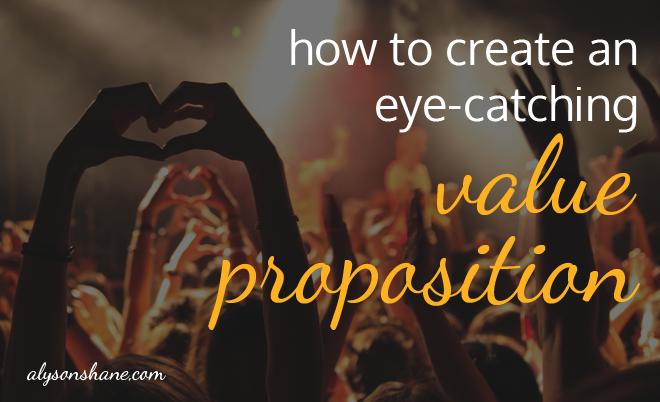
Understanding Your Value
This is tougher than it sounds. For many of us (myself included) our businesses happen as the result of a series of opportunities which may leave us feeling unprepared and confused. This is normal.
When I first started out I knew a few things: I knew what I loved to do (writing, content marketing, and community management) and I knew why my clients wanted to work with me (strong writing skills, good attitude, deep knowledge of my industry), but I struggled to clarify what the value of what those things actually meant to my clients. This takes some serious thought and reflection, and it's okay if you don't know right away.
Some things to ask yourself are:
- What am I exceptionally good at?
- What makes me and my business unique?
- What does a one-sentence summary of how I help my clients/customers look like?
Get to Know Your Ideal Client or Customer
Take a step back from your own train of thought for a second and think like your ideal client or customer, then ask yourself the following questions:
- What do they do?
- What kinds of problems do they have that I can help solve?
- How can my services or product help make their lives easier?
- What do they value?
Not sure how to answer these questions? Ask and do some market research! You can accomplish this in a variety of ways: conducting a Twitter poll, asking friends and colleagues, talking to your mentor - the sky's the limit!
Creating an Eye-Catching Value Proposition
Business is about being different. The more you can stand out from your competitors, the stronger your value proposition will be.
Here's what my value proposition looks like:
I help brands and businesses create long-term content marketing strategies which help them convey the right message to their target audience.
Let's break this down:
- I've identified the kinds of clients I want
- I've stated the kind of work I want to do (copywriting, content marketing, and social media management)
- I've described the kinds of working relationships I want (long-term ones)
- I tell prospective clients how I help them (increasing brand awareness and community growth)
Creating a value proposition which states what you do, what makes you different, and the kinds of clients and working relationships you want to have doesn't just tell your clients about what you do, but it also helps you determine if a potential client or customer is the right fit for you, saving you time in the long run.
Adding Social Proof
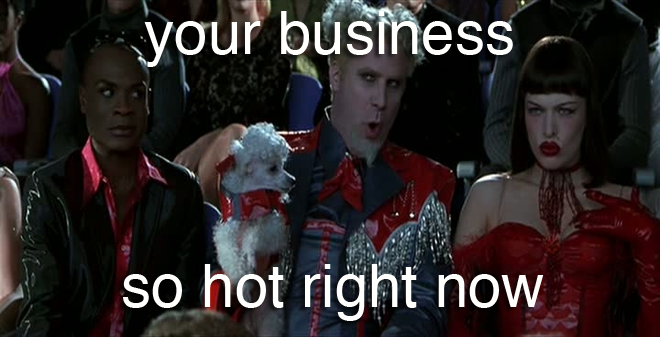
Do you have any accomplishments that you're proud of?
Maybe you were published in your local paper, received an award for excellence in your field, or spoke at a conference - whatever it is, feel free to weave these into your value proposition when you can.
This is called "social proof" and is designed to add to your value proposition in terms of concrete examples of how awesome you and your business are.
You can add things like "voted #1 in my field" or "nominated as 2015 Canadian copywriter of the year" - whatever it is (as long as it's true!) can go a long way to adding weight to your value proposition.
Now it's your turn!
Ask yourself what you want to do, how you'll do it, and how your approach makes you different than other people and businesses in your industry. Got questions? Leave them in the comments or drop me a line!
